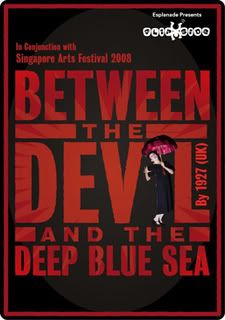 What a mouth full of a title! "Between the Devil and the Deep Blue Sea", presented by 1927, however belies an hour-long multimedia production filled with a pervading sense of rustic allure which aptly suited its strange, gently warped ideas. Set against a timeless Britain of cobbled winding thoughts, two deadpan sisters (played by Esme Appleton and Suzanne Andrade) narrates ten grisly tales a third (Lillian Henley) tinkles chilling tunes at the piano.
What a mouth full of a title! "Between the Devil and the Deep Blue Sea", presented by 1927, however belies an hour-long multimedia production filled with a pervading sense of rustic allure which aptly suited its strange, gently warped ideas. Set against a timeless Britain of cobbled winding thoughts, two deadpan sisters (played by Esme Appleton and Suzanne Andrade) narrates ten grisly tales a third (Lillian Henley) tinkles chilling tunes at the piano.Standing before an intricately shot and designed video (by Paul Bill Barritt), the actresses act out darkly humorous sketches ranging from the profane "The 9 Deaths of Choo Choo le Chat" to the strangely reminiscent "The Sinking City" where men and children moon in the streets, bereft of women lost for - the "clap". Each tale has it's own unique offers, keeping the audience ceaselessly giggling at the edge of their seats.
Among the more memorable tales for me is the delightful "The Tin Biscuit Revolution" in which disgruntled gingerbread men, taunted by the recalcitrant baker, haunted him down with gingerbread guns shooting icing pellets, and eventually taking over the world leaving the rivers running red with raspberry jam.
The second tale, the name of which I have forgotten, was a surrealistic recounting of a dream where the celestial bodies indulged in lesbian orgies and the moon fed her baby stars and depressingly practical brownie girls turn out to be goat demons. And in "Grandmother", two sadistic sisters found among the audience a new playmate to replace their recently escaped granny.
All too soon, the tale came to an end, leaving poor Appleton "running" in the "streets" as reluctant audience members left the recital studio...
1927 Official Website



